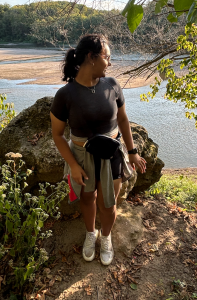48 Personal Reflections
ammanders1; ckodavatiganti; and lpaciga
Alyssa’s Reflection
Throughout this semester, I have learned so much more about Water, Sanitation, and Hygiene (WASH). As a public health major, WASH is a topic that comes up frequently, but being able to explore it in greater depth has been both eye-opening and deeply impactful. Before diving further into this subject, I often took my own access to clean water for granted. I am privileged not to have to think twice about whether the water I drink is safe or whether I can wash my hands or take a shower. Learning more about WASH helped me realize that for billions of people around the world, these are daily concerns that directly affect their health, safety, and even dignity. (AMM)

One topic that stood out to me in particular was the emerging threat of nanoplastics in drinking water. I was shocked to learn how many particles are getting into our water, despite regulations and treatment systems. I have been using a reusable water bottle for years, but since learning about this issue, I have made more of an effort to encourage my friends and family to do the same and be more mindful of plastic use. Overall, learning about WASH has changed the way I think about public health, because it truly is foundational. Safe water is a basic human right, and I have come to understand just how essential these services are to achieving health equity. (AMM)
Chandana’s Reflection
As a third-year public health student on the pre-medicine track, I have learned to appreciate the invisible systems that protect us—those that we take for granted until something goes wrong. Water, for example, is a resource that we rely on every single day, without thinking twice. It is so fundamental to our daily lives that we rarely stop to consider the processes that make it safe to drink. Over the past couple of years, living in Iowa City, I have started to see how fragile this infrastructure can be. Through my research, particularly in WASH (Water, Sanitation, and Hygiene), I have gained a deeper understanding of the complexities of water management and the critical role it plays in public health. This semester has highlighted for me the importance of not just having access to clean water, but ensuring that the systems designed to deliver it are reliable and sustainable. (CK)
Before I moved to Iowa City, I never really gave much thought to the water I drank. Growing up, we always had filtered water from the fridge, and tap water was something I never hesitated to use. We lived near natural water sources, so I trusted that the systems in place were doing their job. Clean water just seemed like a given. When I started living off-campus with my roommates, I quickly realized things were different. Even though we had filters on the fridge and the tap, the water still did not taste right. I began noticing tiny particles floating around, strange smells, and an overall feeling that the water wasn’t as clean as it should be. What used to be something I took for granted became something I had to constantly pay attention to. (CK)
This led my roommates and me to take action. We started using water filters. The new filters worked for a while, making the water taste cleaner and removing some of the visible particles. However, over time, even with regular filter changes, the water quality still was not consistently great. Despite our efforts and the expense of replacing filters every couple of months, the taste remained off, and I continued to notice small, floating particles in the water. This experience made me realize just how much we rely on these systems, and how much responsibility falls on us to protect ourselves from something that should be inherently safe. It was frustrating to see that, despite the technology designed to protect us, we had to take extra steps just to ensure the water was truly clean. (CK)
The financial aspect of using filters also stood out. Filters need to be replaced regularly, and they are not cheap. The financial burden of constantly replacing filters made me reflect on the larger implications of water quality. While using a water filter can be a practical solution for individuals, it is not a long-term fix. Clean water should not be something that requires extra effort or expense. (CK)
While this experience did not change how I view public health, it made my understanding feel more tangible. I have always believed public health is about more than responding to disease—it is about creating sustainable structures that protect people quietly and consistently. Filters may provide short-term relief, but they do not address the larger issue. It should not fall on individuals to ensure their water is safe, especially when public services are meant to handle that. Real change requires strong infrastructure and policies that ensure clean water is reliable and accessible for everyone, not just those who can afford extra precautions. Living in Iowa City reminded me that public health is not just about personal choices. It is shaped by where we live, the resources we can count on, and the trust we place in the systems around us. What once seemed like a small inconvenience became a constant reminder of how essential it is to build structures that protect everyone, not just some. (CK)

Luke’s Reflection
As a public health major, researching water quality and the related policies in Iowa has deepened my understanding of how environmental health and policy intersect to impact entire communities. I learned how critical access to clean water is for preventing disease, supporting mental and physical health, and ensuring environmental justice, especially in a state like Iowa, where agriculture, urban development, and climate change places pressure on water systems. Exploring specific programs like the Iowa Nutrient Reduction Strategy and the Watershed Management Authorities helped me see how public health is connected not just to clinical care or behavioral change, but to buildings, environmental planning, and equal resource allocation across the state. I also gained practical knowledge of how agencies like the Iowa DNR, EPA, and local governments collaborate to monitor, regulate, and fund improvements that ultimately affect public safety.
This project also made me reflect on my personal responsibilities and future goals. Living and studying in Iowa, I now realize how water policy decisions happening around me every day directly impact the health of my campus, my neighbors, and my future patients. Understanding the gaps in access, the challenges of stormwater runoff, and the power of community education has shown me that public health advocacy must include environmental issues. Whether I work in a health department, a nonprofit, or policymaking, I will carry this awareness into my career. It’s not just about treating illness and having clean drinking water, but it’s also about building systems that prevent disturbances in water bodies, and water quality is one of, if not the most, foundational public health system we rely on.

